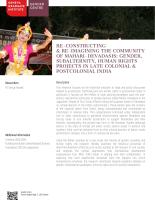This research focuses on the historical evolution of legal and policy discourses related to prostitution, trafficking and sex worker rights in postcolonial India. In particular, it focuses on the effects of state policing paradigms upon the now-extinct, matriarchal community of temple-dancers called Mahari-Devadasis in the Jagannath Temple of Puri, Orissa [‘Mahari’ being the localised name for Devadasis i.e. temple-dancers in the Indian subcontinent]. These women were the creators of the classical dance form Odissi, being conceptualised and criminalised as ‘prostitutes’ in colonial India. This categorisation continued under independent rule in India, contributing to pervasive discrimination against Devadasis and forcing many to turn towards prostitution to support themselves and their families. Subsequently, the present-day form of the Devadasi System (although extinct in the state of Orissa) still exists across several states in western and southern India, and has devolved from an elite cultural practice of dance rituals performed in temples, into a form of commercial sex work.
Using the Mahari example as a case study into themes of gender, sexuality, and human rights, the research thereby examines the historical processes of disenfranchisement afflicting such actors located at the margins of civil society, and analyses the various approaches that international development organisations (ILO, WHO, ICRC) adopt in dealing with their rehabilitation. In exploring how such experiential narratives from the margins can enrich humanitarian initiatives, the research contributes towards academic debates on gender, humanitarian paradigms, minority rights and civil society movements.







